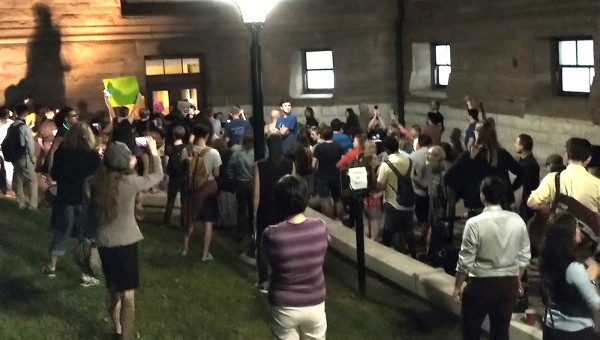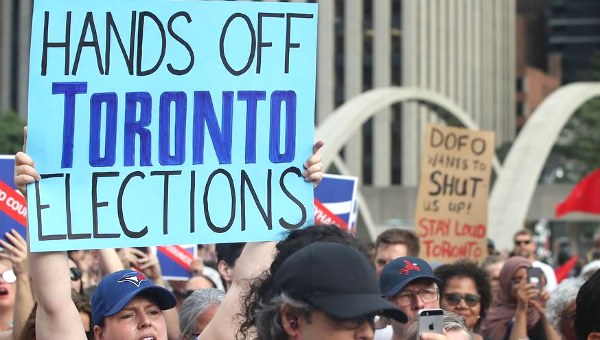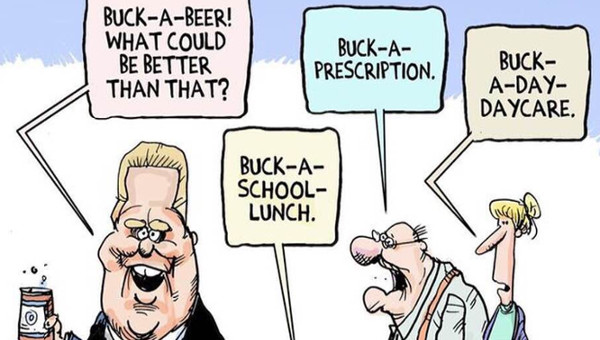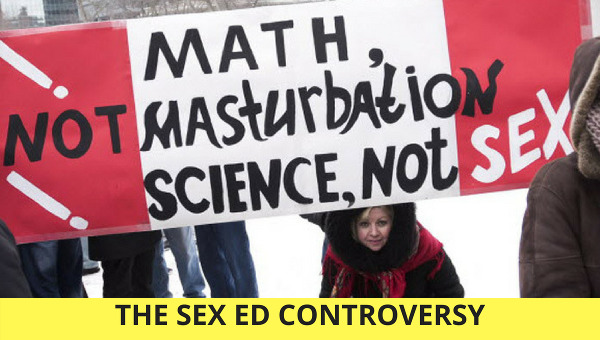Ford’s Attack on Local Democracy in Toronto
Ontario’s new Conservative government, under the leadership of Premier Doug Ford, has launched a cynical attack on local democracy and government in Toronto.
Cutting by almost half the numbers of wards and elected representatives in the middle of an election campaign undermines the electoral process itself. It’s the kind of thing we would expect from an authoritarian regime and it would be roundly denounced if it were imposed in another country. It undermines the potential for Torontonians to fairly debate and make decisions that affect social, economic and political life in the city.
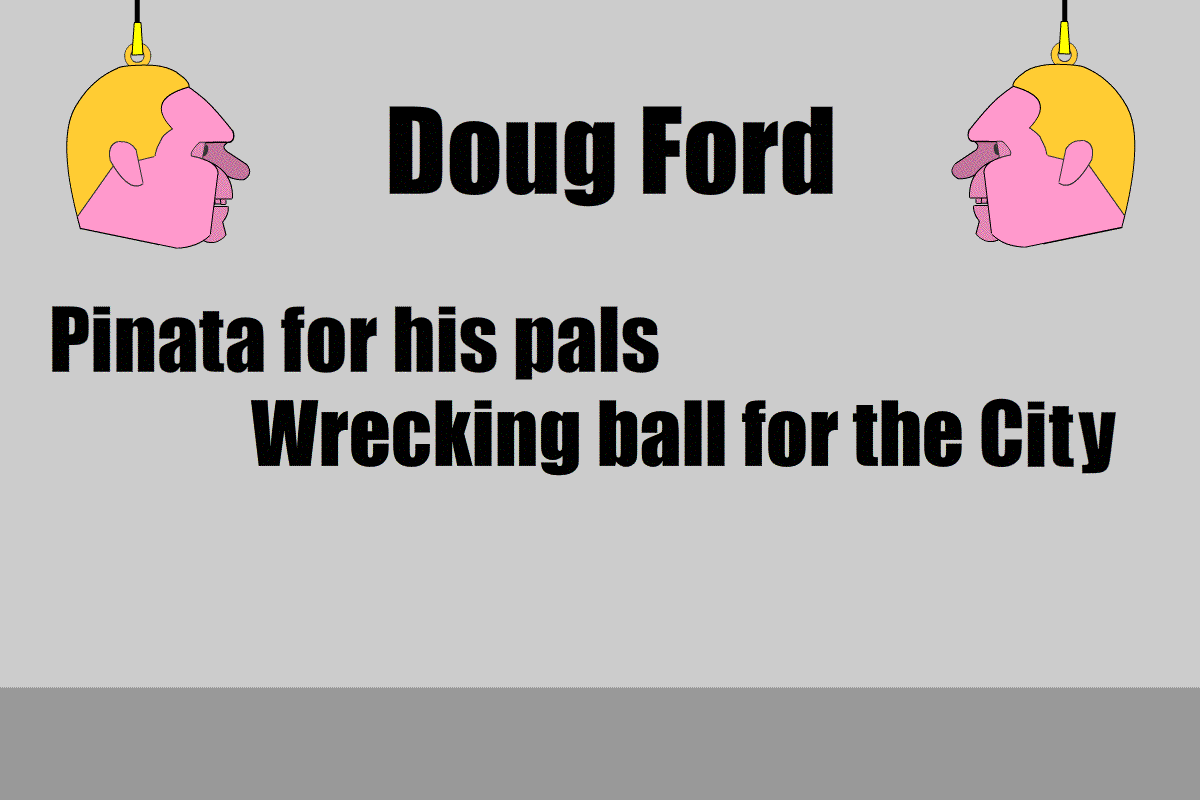
Re-Jigging the Bounderies, in the Middle of an Election
As Toronto City Council exists today, each ward represents, on average, 62,000 people. A 25 ward system modeled on current federal and provincial riding levels would mean 109,000 constituents per councillor.
When one compares Toronto’s representation structure to other Canadian cities, it is clear that this is an attack on democracy. Ottawa has 934,243 people, with 23 city councillors. Its population per councillor is 40,619. Winnipeg, with a population of 705,245, has 14 wards with an average population per ward of 50,374. Calgary, with a population of 1.2 million has an average ward representation of 82,615. Montreal, Canada’s second largest city, with a population of 1.7 million people, has 65 elected officials, consisting of one mayor, 18 borough mayors and 46 city councillors. Since there are borough mayors in the same region as council wards, the average population per councillor is lower than other major cities at 26,635. The average population per ward is 37,059.
Using the phony argument that it will reduce costs, it is a crass attempt to reshape the state’s operations at the municipal level and is meant to facilitate the broader agenda of Ford and his corporate allies. Like all of the actions of the newly elected government at Queen’s Park (such as cutting welfare payment increases, limiting access to socially provided pharmaceuticals, eliminating new oversight reforms on police powers, ending carbon pricing and gutting other climate change initiatives), the Conservatives are deepening the austerity policies of neoliberalism begun by the earlier government of Mike Harris, and continued by the McGuinty Liberals, under the pretence of acting as enemies of waste and stewards of the province’s resources.
The gutting of local democracy in Toronto reflects the authoritarian and bullying approach of Ford and, indeed, his government: demonizing and punishing low income people; starving and further privatizing public and co-operative housing; reducing democratic oversight on policing powers; tearing apart and privatizing the TTC, reducing access to public transit, democratic controls on transit planning and creating different levels of service and costs to transit users; intensifying the precaritization of jobs and sharpening inequality levels; privatizing and weakening the services we need from the city (and province), dramatically reducing the ranks of those who provide those services and attacking worker and union rights.
Ford’s proposals to change local democracy in Toronto are but one part of an effort to further transform the role of Toronto’s city government into facilitating and implanting forms of private accumulation for land developers and financial elites. The Conservatives intend to use the powers of the provincial government to strengthen the power and autonomy of the police to patrol, stop, ‘card’ and even arrest on suspicion in neighbourhoods; this will move Toronto even further away from the social reforms providing opportunities for young people across the city that are necessary to address violence and insecurity in all Toronto communities. The Ford initiatives will also limit the capacity of the city to make decisions that limit the power of private capital and further close off avenues for progressive solutions to the many social, economic and political challenges that working people face today.
A smaller and less representative city council will increase the pressure on councillors to spend their energies and resources on pothole fixing and dealing with everyday constituent needs; it will be more difficult to find the time to fight for key structural changes, such as opposing and undoing provincial downloading, increasing public transit access and funding, massive increases in public and co-operative housing, creating good public sector jobs and services, challenging gentrification, and building neighbourhoods where working people can live decent, safe and rewarding lives.
It hardly needs pointing out that the city (and for that matter, the province and federal governments) has not delivered the things that working people need. No one would expect that from a capitalist state, at whatever scale of governance. But the inability of governments to serve the needs of working class people isn’t caused by too much democracy, from too many representatives and too much debate. The gutting of local representation in Toronto reflects the power of capital, and particularly the real estate, financial and small business sectors that dominate the Toronto economy, and the provincial and local political elites (such as the Ford family, but also councillors like Mammoliti, Holyday, Thompson and the rest) that work in their interests. Cutting the number of elected councillors won’t make things better – it will only increase the influence of those elites and those most subservient to them. Indeed, the reduction of wards and the alignment with existing provincial constituency boundaries will make it more difficult for progressive and left-oriented councillors to get elected.
Local Opposition
Ford’s actions have been condemned by numerous civil society organizations and unions, as well as the Toronto and York Region Labour Council and the Ontario Federation of Labour. There have been numerous rallies and protests at Queen’s Park and Toronto City Council. There are mass canvasses taking place across various communities in Toronto, using petitions and one-on-one discussions to do education with people about Ford’s agenda, to learn about ways of challenging his arguments, and to re-build neighbourhood activism.
The Socialist Project supports all of those who are working to stop Ford and his authoritarian government now sitting in Queen’s Park from forcing these changes on the city. It is important to build this movement into a larger, wider and more politically vital one to block Ford’s broader agenda. It needs to be embedded in working class communities, workplaces and organizations across the city, ready to fight for participatory urban planning, alternative social services, community control, and a socialist-inspired vision of what our city could be. Toronto needs to take the lead in building a movement of rebel cities across Ontario and Canada. •


